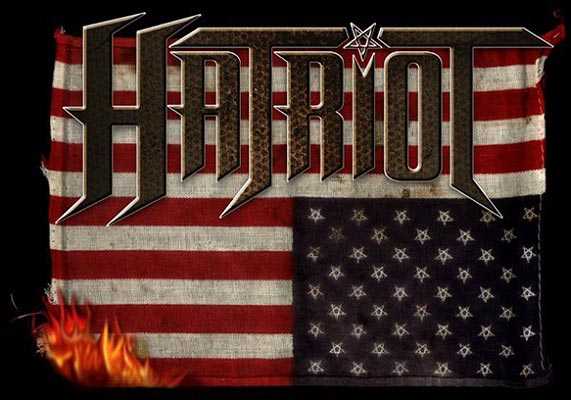
The new prototype of the tough Americans
When I lost all hope of getting answered fearing my questions weren't up to the character, Steve Zetro Souza finally replied making me proud of boasting an interview with the almighty Hatriot.
-Welcome back Steve! Can you tell us how Hatriot was created and why you decided to request your sons’ performance for the first time.
I started working on Hatriot as far back as 2010, when I first met my guitarist, Kosta Varvatakis. We started writing and doing demos of material that we were coming up with, and I would let my friends in the business hear them, and the positive reaction was so strong that I decided to try and do a band again. It’s as simple as that, really. Kosta is such a great guitar player and that really pushed me to give this a shot. As for my sons, they both tried out for the band the same way anybody else would. There was no nepotism or anything like that. Hatriot was holding open auditions and both of my sons earned their way into the band. They have both been playing for years and have become very fluent at their instruments. It is a great feeling of accomplishment knowing that they are following in my footsteps.
-Is the composition and recording method similar to your other bands? Do you need to rehearse often before going on tour?
The writing in Hatriot is pretty much a painless process. Kosta writes and arranges all of the music, and then brings a completed idea into the band. He shows the rest of the band their parts and they sort of revise everything and make it their own. From there we do a jam room recording of the instrumental and I take that home and write lyrics to it. We rehearse three times a week and are very militant when it comes to that. We don’t come to practice to hang out and have a good time. We are there to work. We either rehearse the set for upcoming shows or write new material, but it is always taken very seriously.
-Did you guys feel any pressure, whatsoever when you started writing this new album?
The only pressure we had was put on ourselves. I never want to release anything that doesn’t compare to what I have done in the past. I will never put out a weak record just to have something to sell. If it doesn’t kick ass then I won’t put my name on it. So we were driven to write the heaviest and best thrash metal album that we could create, and I think the results speak for themselves. “Heroes Of Origin” is a fucking monster of a record.
-Was it any painful or demanding process to get all those songs together for that album? Did you have any breaks from the writing process because you possibly couldn't come up with anything or was it more or less very natural for you to get all these songs together for this album?
There is never a shortage of ideas. Kosta is so fluent when it comes to writing that it makes my job a lot easier. If anything, I have to take riffs out of his songs because there are too many good riffs. I make him save a few for later. So far there have been no signs of slowing down when it comes to writing. We have five songs finished for the second album already. This album was a very natural process, and I believe that we have found our signature sound with this one, so future records should be no problem as well.
-The songs appear all as tight as Exodus on steroids and there’re even a few Death metal blast beats. Why did you decide to drop mid-tempos and controlled vocals? Why have the music and the vocals been brought to the extreme in all songs?
I sing whatever fits the song. It’s as simple as that. If the music calls for more aggressive and extreme vocals, then that’s what I attempt to do with it. My roots are obviously rooted in classic thrash, but the other guys are a lot younger, so they have different influences that come through, and that’s where you get the blast beats and death metal guitar picking styles. The guys just like more extreme stuff. That’s the way of the new generation. It’s cool because it pushes me into trying different vocals and it keeps things from getting predictable. My voice has grown and developed a lot over the years. The early Exodus stuff seems more controlled because I was just learning how to use my voice. Now it is stronger than ever.
-So are you still able to remember what's the oldest song you wrote for this album and can you tell how long cap is there between the oldest – and newest song on this album actually?
The oldest song is “The Mechanics Of Annihilation” which is the first song we wrote together. It was also one that we had on our four song demo last year. Another song from the demo was called “The Fear Within” and it will actually be on the second Hatriot record, due out early next year. I’d say on this album the songs were written over the course of a year and a half.
-I didn’t find the guitar credits in the artwork. Is it correct to say that solos, licks and the awesome riffs are equally distributed between the two guitar players?
For the most parts the guitar solos are divided between the two of them pretty equally. Kosta writes all the songs, and he grew up on old school thrash arrangements, so he understands the need for the ‘tag team’ approach to soloing in a song. He definitely understands the dynamics of thrash metal. So to answer your question, yes they trade off in every song, very much the same way that Gary Holt and Rick Hunolt did in the classic line-up of Exodus.
-The lyrics, the artwork and the moniker itself deal with hatriots and different kinds of killers. Is this a polemic to your country or a simple analysis of reality? Or are you metaphorically fighting to wake up Americans from the hatriots from rural small-town America?
I say it a lot in the press, and I will say it here – to me a hatriot is a person who loves their country but doesn’t agree with the moves that the government makes. It is not really about being a killer, but more of a metaphor for being a renegade or a rebel. Thrash metal has always been about being rebellious and against the grain. We have no agenda to wake people up or to push a political message. It is simply an aggressive sounding word and it fits the attitude of the band.
-Somebody complained about the recording, but I didn’t find particular flaws in Urteaga’s production. Would you change or improve something if the album was re-released in future?
I wouldn’t change a thing. This album is as close to perfect as any of the recordings I have done in the past. I think it is a very strong statement for its time. With any album that an artist puts out you can usually find something you wish you had done differently, but with this record I think we pretty much nailed it. I’m very satisfied with the final result. Of course there are going to be people that complain and wish it was produced differently, or had different artwork, but I am very pleased with it. It is a great thrash metal album. Juan did a great job producing.
-Also, what was his working method if compared to the other producers you met in your long career?
Juan kept everything very casual and relaxed, which was cool because it was the first time the other guys in the band had done a record. Juan made it a point to keep the pressure off so we could just have fun with it and get a good performance caught on tape. In the past I have used bigger name producers, like Andy Sneap, and they are real perfectionists. That’s cool and you get a good final result, but often it is hard to relax and just play your best. The pressure is constantly on with somebody like that. With Juan it feels like we are just in a room jamming together. He did a great job and we will definitely work with him again.
-As for your current deal with Massacre, what made you sign for them?
One of our managers – a guy by the name of Ace Cook – manages Laaz Rockit as well, and they have their back catalogue out through Massacre Records, so we already had an established connection to that label. They were interested in getting an album out immediately, and we liked that excitement, so we went with them. There were a few other labels interested, but Massacre was willing to get things moving quickly and get a product into the marketplace, so it made sense to go with them.
-I’ve downloaded the two official videos you used to promote your album. Please let us know who’s behind the concepts of them and why they weren’t shot in HD.
Both of the videos were filmed and directed by Mike Sloat, who has worked with a lot of big bands. He has done videos for everybody from Lynyrd Skynyrd to Testament and really knows how to make a good looking video on a budget. As for the HD thing, you’d have to ask Mike. If I were to guess it would probably be due to budget restrictions. I think they both look great and they serve their purpose.
-After all these years, it’s difficult to keep track of all the bands you created. What can you tell us about Tenet, Dublin Death patrol and the other bands (Exodus included)?
My first real band was called Metal Warrior, and that band also had Phil Demmel from Machine Head. From there I started Legacy, which as you know became Testament a couple years later after I quit to join Exodus. Tenet was a solo project of Jed Simon from Strapping Young Lad. That’s his baby. He basically had a deal with Century Media, but they wanted a known singer. I was available so I went for it and had a great time doing that record. Dublin Death Patrol is pretty much over now, but it was a band of friends from Dublin, California, just getting together to have fun. Chuck Billy and I were obviously big selling points with that, but our schedules are too busy to commit to anything major. I also have an AC/DC tribute band called AC/DZ, and we only do Bon Scott era stuff. Right now there is no time for any of that though. All my energy is devoted to Hatriot right now.
-What did you learn from this job, besides the fact that it’s a good idea to use earplugs live and in the rehearsal room if you wanna go on for decades (joking)? What do you suggest your kids and the teenagers wanting to start a professional metal band? Is it fundamental to have a promotion manager or can they do everything by themselves?
There is no real set way to become a professional metal band. It happened to all of us known guys by accident. There is no formula. You just have to have a lot of passion and work ethic with this music. You have to be willing to devote all your time into practicing and promoting, but at the same time you need to have fun with it and be flexible. You need to be able to take advantage of opportunities when they come your way. There is a lot of luck involved with doing things on a bigger scale. Bands starting out can do everything themselves. When you start making a lot of noise on a bigger level the managers and industry people will start to seek you out. You don’t have to go after them. Do all that you can as an independent artist and that will give you more leverage when you have to negotiate deals.
-Being from Oakland and in the Bay Area must be the best for someone like you and the genres played with all your bands, but did you anyway ever feel the urge to relocate someplace else? Do you think that if you were from Washington your music, the scene you would’ve attended and the culture you’d have been offered when you were a kid would have delivered different results?
I think the universe plants us where we are supposed to be in life. I never wanted to be based out of anywhere but the Bay Area. If I was from another town then my life would have definitely been a lot different. You just have to make the best out of where you are at. The town I live in (Dublin, CA) isn’t very big at all but there are a lot of big name hard rock and heavy metal guys that came out of my neighborhood. Chuck Billy, Phil Demmel of Machine Head, Troy Lucketta of Tesla, and the list goes on…
-How would you see the Bay Area Metal scene has been changing over the years? I read that it has changed a huge way noticing the fact that most of the bands broke up, most of the clubs closed down from that area, including rehearsal places closed down. And then with the whole '.com – explosion', it made San Francisco virtually unaffordable to most artists and musicians. And what came in, was a very conservative group of computer people releasing safe music like THIRD EYE BLIND, TRAIN and stuff like this. And then after the .com –crash happened, now you're seeing they are coming around a full circle. All these more Metal bands are coming in; you're seeing all these artists coming back to San Francisco, rents are slowly going down and new clubs are opening up. And there's new rehearsal places opening up. At least in the '80s many bands that came from that specific area, seemed to have this strong unity thing between each other, like all band members coming from the same big family where everyone supported each other? Do you still feel you have that strong bond thing between bands in the Bay Area Metal scene like you did back in the day?
There is no scene really. The days of bands being brothers and working together to build something are definitely over. Back in the day we had shows almost every night of the week. Now it is only on weekends. There is no real rock and metal scene like there once was. It is sad really, but things change and time moves on.
-Who’re some of your microphone idols?
There are several. I love all the classic bands and singers from the 70’s and early 80’s. My favorite singer ever is Bon Scott. I also love Dio, Halford, Ozzy, Dickinson, Udo, and a lot more.
-Heroes of origin was released some months ago. What’s boiling in for Hatriot? What new songs do we have to expect? What bands are you touring Europe with?
It’s looking like we will be touring Europe in the fall with Toxik. That’s what we have been offered anyway. Right now we are working on new songs and actually have five new ones ready for the next Hatriot record, so I’m thinking we will be in the studio around September and will have a new record out at the first of 2014. We are always working on music. There is no time for waiting around.
-I’d like you to spend some words on the recently passed Jeff Hannemann, which you for sure knew well as a person, too. What can you tell us about his human side that people like me, that never met him, don’t know? Anecdotes, significant episodes..
Yeah, I have known Jeff since the beginning of Slayer. I went to all their early shows at Ruthie’s Inn, back when they still wore the eye makeup. Jeff was a really funny guy. He was quiet and reserved, but would cut up and joke around with his close friends. I had a lot of great times with him back in the early days of thrash. He is definitely one of the best of all time and will be missed.
-What do you do when you’re not on tour? What’s your official job?
When I am not on tour I am a foreman at a construction company. I make great money at it, and have been doing that ever since the first time Exodus split up in 1992. People think that famous musicians are rolling in cash, but that just isn’t the case. I have a great life – a cool house with a pool and stuff like that – because of the construction job. Music sure as hell ain’t paying for it.
-Is it the best job/situation in the world to be a popular Metal musician/singer or are you always afraid of being ‘damned’ ? I know shit happens but the list of sick or prematurely deceased renowned Metal musicians is long:Jeff Hannemann, Paul Baloff, Jeff Becerra, Cliff Burton, Clive Burr, Chuck Schuldiner, Piggy, Dimebag Darrell, Drowning Pool’s David Wayne Williams, Megadeth’s Gar Samuelson, Peter Steele, Death Angel’s Andy Galeon, Randy Rhoads, Ratt’s Crosby, Decapitated’s Witold Kieltyka, Dead, Euronymous, and many many others. Just a hell of coincidences or is it a malediction?
It is a great situation and I am very fortunate to be able to play music on the level that I do. I’m not afraid of being damned or of dying early. It is a high risk business, but at the same time you have to look at it like this – the guys that you mentioned lived a fuller and more eventful life than most people do who live to be 90 years old. They all saw the world and left a huge mark on modern culture in a short amount of time. To me that is a lot cooler than living to be 90 and never leaving your home town.
-You’ve been on independent and major labels over the years. How have the record labels changed in your years in the music industry?
They have a lot less power, that is for sure. Back in the day the record company was the gatekeeper of your career, so to speak. They financed everything and had all the promotional contacts. Now, in the age of the internet, the artist has taken back a lot of that control. Technology allows the artist to make albums cheap and promote independently. The role of the label now is more for distributing the product. The business model is totally different. Back then artists made money from record sales, so the touring was more of a promotional tool to sell records. Now it is the opposite. The album is a promotional tool to get the artist on the road, and that’s where money is made – from shows and merchandise.
-What European country and what US State has the most loyal and rabid fan base to Hatriot?
You would have to ask one of the guys in the band. They are all involved in the social media and internet promotion and could probably answer that question better than I can. I would guess that Germany would be a big one for us, since our label is based there and we do a lot of press in that area. I have no idea about the US really. What I do know is we appreciate every fan, no matter where they are from. The fan base is definitely building everywhere.
Have you been able to meet any of your old fans during this on-going European tour who have been following your band since the Legacy and Exodus demo days up to this day?
I meet fans at every show that have been following since the beginning. That is really the big pay off of it all. To be able to affect people on that level is truly an amazing thing. Sometimes I run into fans that have collected every single thing I have done – singles, EPs, bootlegs – everything. That kind of stuff blows my mind.
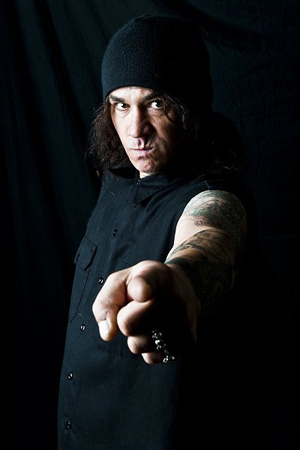
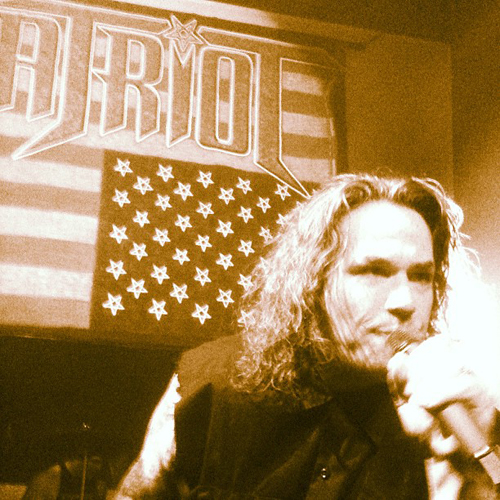
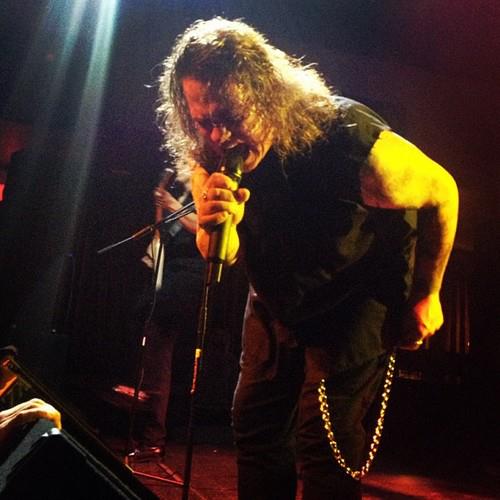
-What’s the craziest things happened on tour with Hatriot, Exodus or another of your bands?
There have been a lot of crazy times over the years, but one that stands out in my mind happened during an Exodus tour around 1989 in Germany. Apparently there was a big soccer championship going on over there at the time, and it was a really big deal to these people. There were drunken people everywhere singing in the streets, like old grandmas who were hammered drunk singing at the top of their lungs. It was very funny and stands out in my mind.
-What’s currently on rotation on your CD player or Ipod?
I tend to go back to the classics. I have Led Zeppelin’s second album in rotation, some early Kiss, “Strong Arm Of The Law” by Saxon, and a bunch of Slayer. That’s my current playlist.
-Shit man, but unfortunately it seems like I think our time is coming to its end...Thanks so much for your time and the detailed answers. Feel free to add whatever important I didn’t ask you of.
Thank you, Markus, for the chance to promote Hatriot to your readers. I want to thank all the fans for giving this band a chance. For those who have yet to buy the record, I promise you won’t be disappointed. It is one of my proudest moments as a musician. Hope to see you all on tour! ZETRO
MARKUS GANZHERRLICH - June
2nd , 2013
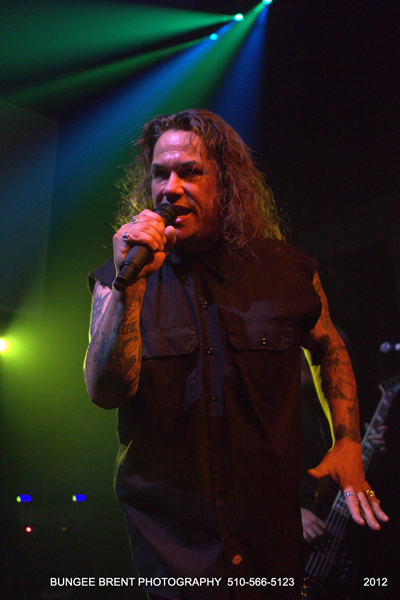
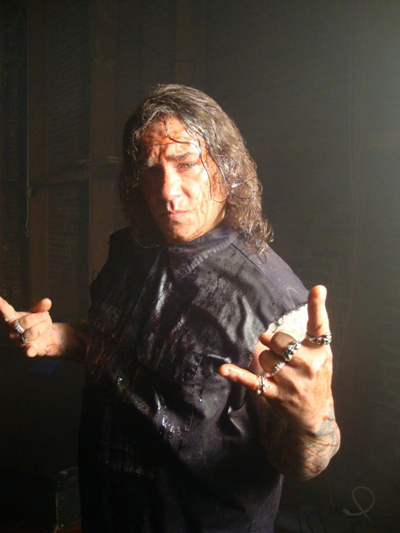
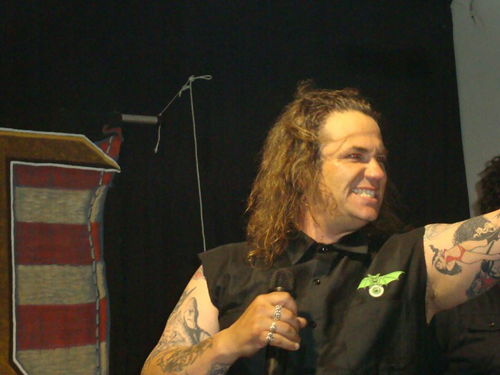
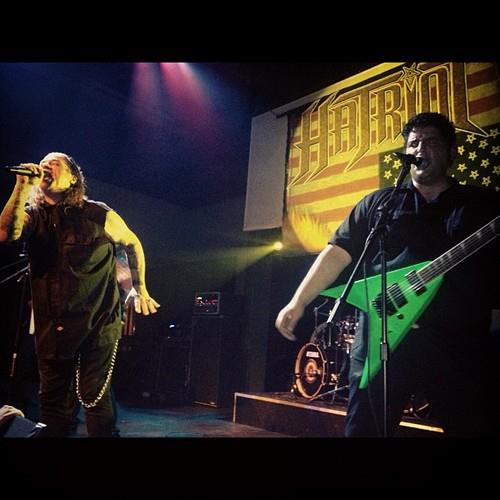
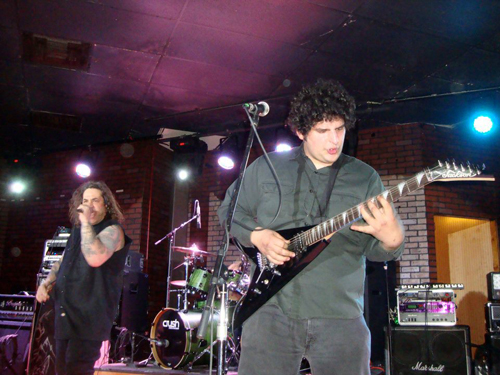
Line-up on this record:
Steve Zetro Souza - v. (Dublin Death Patrol, ex-Tenet, AC/DZ (AC/DC tribute), ex-Exodus, ex-Testament, ex-Legacy, ex-F-Bomb, ex-Metal Warrior)
Kosta Varvatakis - g.
Miguel Esparza - g.
Cody Souza - b. (ex-Oskorei)
Nick Souza - d. (ex-Oskorei)
Contacts:
Dublin, Oakland, Ca - USA
E-mail: hatriot_managment@yahoo.com
Official sites:
http://www.myspace.com/hatriot_metal
http://www.hatriotmetal.com/
Demo-/Disco-graphy:
-Hatriot (Demo - 2011)
-The Violent Times of My Dark Passenger (single - 2012)
-Heroes of Origin (CD - 2012)
